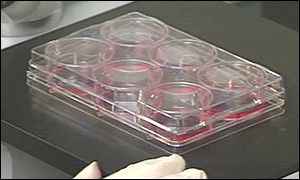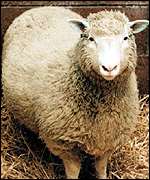
URL: http://news.bbc.co.uk/hi/english/sci/tech/newsid_1186000/1186291.stm
Date accessed: 25 February 2001
BBC News
Friday, 23 February, 2001, 17:45 GMT

The US subsidiary of PPL Therapeutics announced on Friday that it had re-wound the genetic clock of skin cells, to create "master" stem cells.
I believe it will be equally applicable to humans
|
|
Dr Ron James, PPL
|
The reverted cells were then programmed to develop into functioning beating heart cells, in the laboratory.
The research has major implications for the controversy over using cloned human embryos to conduct research into new medical treatments.
It increases the chances of using adult stem cells, rather than those taken from embryos, to develop nerve tissue, heart muscle or even brain cells for transplant.
Stem cells are unprogrammed "master" cells with the ability to develop into any of the different kinds of tissue that make up the human body.
Commercial secret
PPL Therapeutics is keeping full details of the technique used a secret for commercial reasons. But Dr Ron James, managing director of the Edinburgh-based biotech company, revealed the early findings of the work at a meeting of the British Fertility Society in London.

Dolly was cloned by scientists at PPL and the Roslin
Institute, Scotland
|
The Church of Scotland welcomed the announcement saying it was encouraging that direct reprogramming of human cells might now be possible.
The church's Society, Religion and Technology Project director Dr Donald Bruce said: "This is an encouraging breakthrough in the search for replacement cells to treat serious diseases without the need to use human embryos.
"It's obviously still too early to say that this is the solution we've been looking for, but it is certainly a step in the right direction."
Embryo research
In the past, scientists have focused on embryonic stem cells in their search for new treatments because these are more flexible than adult stem cells.
But religious and pro-life groups have condemned the use of embryos for such research.
In January, Britain became the first country to allow the use of human embryos in stem cell research.
UK politicians voted in favour of extending the research done on human embryos to allow stem cells to be taken from embryos at a very early stage of development.
Category: 30. Xenotransplantation